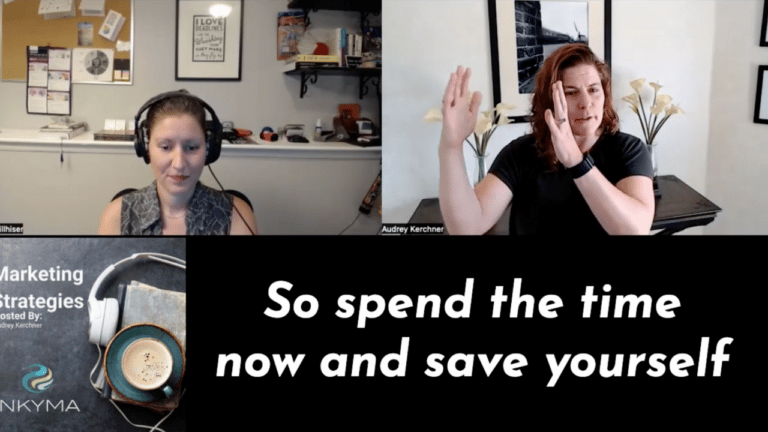Marketing your business well leads to awareness and leads. If you have a great sales process, you close those leads. Getting really busy and getting more clients can be overwhelming if you don’t have processes for business growth in place.
In my interview today with Jessical Millhiser, we talk about how to create processes for business growth and teams to help with the expansion so that you can continue to grow your business while serving all your new and existing clients.
The process for business growth can be an endeavor while you’re trying to bring your company to life. Our guest today, Jessica Millhiser, has been working in an operational and administrative capacity for over 15 years in various industries. She has been the author of and guest writer for multiple business books, interviewed on podcasts, and has a Master’s degree in Coaching & Administration. She is the go-to person to help you get your business running more consistently and efficiently.
Links Mentioned In This Episode
Links & information for show notes:
Jessica Millhiser – JMills Consulting LLC
Podcast episodes, articles, and books mentioned in this episode
Episode 41 – Using Artificial Intelligence to Streamline Your Marketing
Episode 44- ROI Of Time From A Marketer’s Perspective
Love our Podcast? Buy us a cup of coffee to help keep creating for you – paypal.me/InkymaMarketingstrat
Check out our new blog at marketingmasterminds.co free marketing educational content with how-to’s and training coming soon.
What we discussed:
- Organize your business (physically and digitally)
- What you need before you hire help
- And you guessed it … automation!
Processes For Business Growth – Interview with Jessica Millhiser
*Not ready to give this episode a listen or watch just yet? Below is a rough transcript of today’s episode.*
Hi everyone. This is a Audrey Kerchner and this is Inkyma’s Marketing Strategies podcast, and today we have a guest. We’ve got Jessica Millheiser. I say that right, Jessica? Yes. Awesome. With JMills consulting and she is a business coach. I love having conversations on record with business coaches for you guys because marketing and business are so intertwined… at all levels, actually, I really think about it. So we’re gonna have a chat today. But anything we talk about…so, I know Jessica has some events she wants to share. She might have some documents, some links, all of that stuff is gonna be in the show notes for you guys for this episode. Definitely go to the website, INKYMA.com, to take a look at the show notes. And of course the rough transcript is going to be there as well. So you can pick through it and get the information that you need. Jessica welcome. I’m so glad to have you on the podcast today. I think what you do is so important for businesses.
So I know what you do. Why don’t you explain a little bit about what you do to the to the podcast audience? Okay Audrey, thank you so much for having me. I’m really happy to be here and chat and help everyone understand what a business consultant can help them with.
So basically my focus is in operations, admin, and logistics. But I specifically like to help women that are in business growth phases. So what does that mean? That means you’re probably making a minimum of maybe 80K in revenue a year. You’re maybe feeling overwhelmed, bogged down in the day to day. You’re having trouble keeping up with an increase in your demand.
Maybe you’re seeing consistent increases in your product or service. Maybe things are getting missed. Maybe you’re thinking about hiring some help, but you don’t really know where to start. I wanna come and help you navigate that territory because the transition into,
“Oh, I’m doing this myself. Oh my gosh. Things are getting really busy. I can’t keep doing it by myself. I need some help.” That’s an interesting period
to try and navigate. And that’s gonna come from your marketing success, your lead success, your social media success. So all of that good work you’re doing is now generating increase in sales
increase in clients,
increase in product demand. So we wanna set you up in a way that you can facilitate that growth in a streamlined, organized fashion. And that’s what I think is so important about having a business consultant, because like you, I work with clients that are in that growth phase. They come to me and they’re like, I want more clients.
I need all the right marketing things in place. I need automation, whatever it is, we get it set up and it starts working. They get the leads, they close the leads, they’re getting the clients. And all of a sudden they get to a point where they’re like, oh my gosh, I have all this new work and now I’m underwater.
So tell me a little bit about that part of the process for you. Like how do you help businesses when they’re, I guess it’s two parts, right? It’s the one part it’s okay, they’re getting the leads and then processing those leads cuz that’s businessy stuff. And then once they close it…what happens when they start growing beyond their boundaries.
We would probably approach it in… A) we would have a consult and be like, Hey, like what’s going on? Tell me where you’re at. Tell me where you’re trying to go. Tell me your trouble points. And then we would work on okay, awesome. This is where I think I can help you, et cetera, et cetera.
Biggest things are gonna be organization. Documentation. And then essentially getting ready to hire some help. So getting organized: do you have folders have you created digital folders for yourself? So thinking okay, I’ve got a folder for all my clients. I’ve got a folder for all my policies and procedures.
I’ve got a folder for all my expenses and revenue and sales leads. I’ve got a folder for like my CRM leads. So are you getting organized and is the information easily accessible for you? Because time is money, right? Time is your finite resource. You can only do so much in a day. So I want you to be able to move through the daily mundane tasks quickly and efficiently so that you can move on to being like servicing your clients or being more strategic with where you’re trying to bring your business and thinking about the bigger picture stuff.
This next step of that would be documenting. So I like to tell people this all the time: document right away, like right now, even if it’s just you, even if you’re in month three, you wanna document how you do things. And what that means is like, for all of your daily tasks be like, okay, awesome.
This is how I perform this task. I want to type it up, break it down step by step, because eventually the goal is to make everything repeatable and automated as much as possible. Because again, that’s gonna save you time. So as you’re growing, as you’re getting more leads, as you’re getting busier, Having an organizational system, where are you finding your information and having documented steps on how you do daily tasks, those things combined are gonna save you time. Which is ultimately gonna lead to more revenue, increasing sales, things like that. Cuz you can focus on that part of your business. And then lastly, I would say…because some entrepreneurs are very hesitant to start hiring help. They’re like, oh my gosh, this is my baby. You know what if I bring somebody on and they don’t do a good job?
That’s kind of a risk, no matter what. But if you start from a place of, I’m gonna create an internal hiring and training manual, that’s what I would say is your first manual that you wanna have in place. So that’s what job am I hiring for? What are the roles and responsibilities? What is the expectation I have of this person?
Even if it’s a part-time admin assistant, or maybe it’s somebody else you wanna bring in that helps you perform or run through the sales or helps you take on some of those sales you wanna have that in place. So then you think about like, where am I gonna find this person? How am I gonna determine if they’re qualified?
What are the experience parameters and background parameters that I’m looking for to bring somebody in. Then you wanna think about, okay, how am I training them? What are my processes for onboarding them? So the internal hiring and training manual, I want you to think about as your guide to bringing on some help, whether that’s a part-time admin person, a full-time person that’s performing whatever responsibility you need, it will be helpful for you.
And that will help you bring on the right person. Figuring out what interview questions you wanna ask. Things like that. Absolutely. So that’s like how the process is. Yeah. So I would do organization, documentation, and then where are you at in terms of your hiring requirements? And I think that’s, I think that’s important.
I love the repeatable and automation, because if you can make a process repeatable. And then you can train someone. And so you don’t have to hire someone with these big skill sets. You can hire someone that is like-minded to you and your business and how you service, and then you teach them the skills they need to do that.
Exactly. Very well documented and repeatable job. And I think the majority, I think anything can be processed. Turned into a process and then a hundred percent decide. Yeah, I think so. I’ve done it over the years. It’s wow, this seems like it’s a big thing. And then I do it for a while and then I’m like, no, there’s a process.
And I document it and then I hand it off. Yes. And then I get onto the next thing. That’s how I do it is I learn it first. And then I send it on its merry way to whomever needs to do the work. Certain things are a little tougher, then that’s when you hire expertise, like in my world, it’s like web design and graphic design.
It’s okay, I’m not gonna teach someone how to do all of that. But most of the other stuff absolutely. And I will also say like that part of the business can be a little tedious. It can be time consuming. And you’re like, why am I doing this? What is the point? It’s all in my head. I know how to do this, that and the other. But you only have so much bandwidth.
And as you continue to grow, you’re no longer gonna have the capacity to continue to just keep everything in your brain and you’re gonna need help. So taking the time to write down those step by step processes will allow you to essentially bring somebody in and plug them in and be like, Hey, here are your responsibilities.
Here are all the documentation for those responsibilities, have at it. So you can just bring whoever in and they can immediately start taking off some of those things from your plate. Yeah. I like to call that the ROI of time. I did a whole episode on that, where it’s you invest that time right now.
It’s gonna pay dividends down the road hundred percent. And it. And it could be financial because if you don’t have to hire someone to sort that for you, you can bring in a lower cost worker because it’s done for you. So spend the time now and save yourself a little money and a lot of time on the back end.
Cuz we as business owners, we’re all about what’s gonna cost what’s the time what’s the investment, as you get bigger, time is a commodity that is very, very precious. And I would also say, once you get organized, once you start working on this documentation, this stuff will save you time, increase your revenue.
It will also enhance the quality of work. It will reduce the amount of errors. It will reduce potential risks and liabilities, and it’ll allow you, and it’ll allow you to focus on your business’s future. So it’s…there’s four or five different things that are like, if you have these things in place, you’re going to be setting yourself up for success.
Yeah. Yeah, definitely. And then it makes the future growth roll in so much easier. So I’m curious, you talk about organization and I am a fairly organized person. I always have been, but I have clients and I meet people who are not, right? They’re just all over the place. Do you have a fun organization story that you can share with us?
No names. But just like what you found
and what you saw.
So I worked with this person once and they were amazing. They were super passionate about what they were doing. They were like, yes, I love this. I have a plan. And the biggest thing that comes to mind is their inbox. I was like working with them. We were screen sharing.
We were looking through some stuff together and I was like, “Oh, my God. You have 1,224 emails in your inbox right now? How are you surviving?” Oh my gosh. That is one thing. I have like videos on how to try to scale that down. And I’m a big fan of if it’s older than a month, you bespoke delete that. Like you do not need that email if it’s been in your box for a month.
I had to work with them on being like, okay, here’s one thing that we’re gonna do together. We’re gonna create email tabs, email folders for yourself. So clients, finances, sales, new leads, whatever kind of main criteria you have. You’re gonna create a tab folder for yourself within your email. And then you’re gonna reply to the emails and then be like, oh, this is a new lead, click it, move it into that new leads folder. And it’s now out of your inbox. So that is a story. And that honestly happens with a lot more people than I would like to admit. A lot of people’s emails are out of control these days. Yeah. And it can be a source of stress, right?
You’re like, oh my God, all these emails, I’m never gonna get through them. Or they’re just like sitting there. So if you can clean that up, bulk delete, create some tabs for yourself and there’s every time you respond or reply, move them over. So they’re out of your view. I think that’ll help a lot. Oh, absolutely.
I start to hyperventilate if there’s more than 10 emails in my inbox each day, like I have a whole system and it’s I’m like, oh my God, there’s so much for me to do. I’ve got 15 emails. So be like, what, why I have that many? And then when it’s empty, I’m all shiny and happy. I’m like I did everything there.
Maybe more stuff on the, to do list, but yeah, sure. That’s good. But if you can try to finish your day with maybe an empty inbox or maybe only one or two chilling in there. That is, I feel like that’s a good day. Yeah. Yeah. Then you feel like you’ve accomplished something, even if it was total chaos.
So you talked a little bit about obviously process and then you mentioned the word automation. So I’m gonna come back to that. Do you ever help set up automation or recommend automation? Cause I have a whole podcast on automation too. I love automation. So tell me about that. So that’s really gonna be business dependent and it’s gonna really depend on what you actually need that automation to do.
So is it something as simple as you wanna use Calendly because you wanna be more efficient with your bookings? And your email reminders and your meeting setups. I would highly recommend using something like Calendly if you’re not already. If you are somebody that needs to invoice quickly or regularly, or often, I would start thinking about bringing in a software system that can do that automatically for you, whether that’s QuickBooks, whether that’s something else, there are systems that you can set up for yourself.
It’ll be like, okay, I’m invoicing this person every two weeks…done. Or once a month…done. And it just takes care of it for you. And it sends them reminders if they’re like late or delayed on that payment. And it doesn’t make you the bad guy. Cause sometimes entrepreneurs, especially if they’re newer, they’re like, okay, this person hasn’t paid me yet.
I’m gonna keep following up, keep following up. And you feel like a drag. You’re like…I’m such a pest, but like you’re doing solid work. You need to be paid for your work. So if you have a system that kind of takes care of all those reminders for you, it’s just Hey, like this is the system, this is our payment schedule.
So that would be, those would be two processes to software systems that I would definitely encourage. And then beyond that, it depends on what you need it to do and like how automated you can get it, because once you automate something, you are relinquishing control, which is a good thing and a bad thing.
So if you’re like, okay, great. I no longer want this on my plate at all. I’m gonna set this software system up. It’s gonna take care of this for me. Cool. Go. Or if you’re more like, gosh, I’m not quite ready to be that hands off yet. Maybe just start to research, figure out what it is you actually need from it.
And then start moving from there. Yeah, definitely will be super helpful. You make me feel really good because I have all of my invoicing automated. I set that up many, many, many years ago. Cause we do a lot of reoccurring. I’ve got stuff that sends out an invoice once a year. And I just. I just poke in and look at it every month when everything goes off and does its thing.
But other than that, and then it automatically receives payments via credit card, which, for me the price of those fees. Yeah. When I get paid within three days of invoicing, That’s awesome. Yep. So yeah, I think really good now so much. good. I’m doing it. I’m doing it. The system I use is Wave.
A lot of people haven’t heard of it, but it’s online. It’s really great for
service based businesses. If you’ve got inventory or products, goods that you have to pull in, maybe not so great, but a hundred percent service based, it’s great. And they don’t charge you to use it where they make their money is when they’re collecting the credit card fees when you collect credit cards.
But if you don’t, it’s actually free. So what’s the name of it again? It’s Wave. I’ve been using it for years. I’ll look with that one. Yeah. And I haven’t ever felt the need to go QuickBooks. Yeah. And you may not like there’s so many things out there and I actually have a running list now of different software programs that do different things.
So if somebody asks me, Hey, I need help with this. I be like hold on. Let me just look over my list. Yeah. And see what I can suggest, like Honeybook, I’ve heard really good things about, Asana I’ve heard really good things about. Yeah, I’ve heard good things about Honeybook too.
And then for like project management, we use Trello. Okay. Because we have content that we have to write every single month, like clockwork for clients. And so we have a whole process that Trello manages for us, between my manager and the writers and the graphic designer. It’s really cool.
The way we have it set up, we put a little bit of specialized code in there for that. Sweet. Yeah. That’s awesome. Yeah. So I love our, yeah, the more you can automate, the more you can automate. And the more you can take off your own plate, like the better, as long as you’re comfortable with that. Like as long as you’re in a place where you feel comfortable and ready to relinquish that, but the sooner you can, the better it will be for you.
Absolutely. And it’s less expensive too. Like a lot of people look at the price of these tools and they’re like, wow, that’s expensive. I’m like, okay. Is there a human being that will take that as your monthly salary to do the same amount of work that system is doing for you? That true $50 a month, the $75 a month.
The answer’s usually no,
And what’s great is automation never takes a vacation. Their boyfriend never dumps them. They never spill coffee on themselves on the way to work and then have to turn around and go back and all the things that come with us humans. Yes, exactly. That’s why I like it. So in your list of automations, anything on the top of your head, regardless of what it’s for is a really cool tool that maybe most people haven’t heard of.
I like I do a lot of product recommendations myself because sometimes people just need the right direction. There’s nine calendar systems and their five bookkeeping systems and having a professional give them a recommendation is always super helpful. Got yes. My, I have my list, but it’s not loading right now.
Let me see if I can find this in a different way. Sure. I just thought it would be cool and helpful, cuz I love talking automation. And process and all that good stuff. Absolutely. The two main ones that I push a lot are Honeybook and Asana. Yeah. Those are the two that I think are the most beneficial in terms of CRM service, keeping track of payment, invoicing, stuff like that.
There it is my resources thing.
Yes. Obviously, Mindbody. So if like you’re in a business, that’s maybe salon, spa, fitness, something like that Mindbody’s a great platform for that. It definitely takes payment and it has CRM capabilities. We talked about that’s nice all together where your CRM system. Yes. And your payments are in the same place.
You can throw all your leads in when they get client. It comes back with an invoice on the other. I like that. Yeah. The integration ones are really good. So Practice Better is one that I found as well. So it’s a management platform for health and wellness professionals. So it does bookings, payments, tracking, client progress, client management scheduling and billing.
So that’s another kind of all in one platform. Asana is good if you have a big team and you’re working on a bunch of projects, it’s good for tracking marketing sales, operations, project management campaign management, stuff like that. And some of these are free or nominal per month, depending on how many users you need.
But then obviously if you have more users, it’s a little more expensive. Insightly is another one CRM sales and marketing platform. So again, like how are you tracking your leads? How are you staying connected to people that are interested in your product or service? And then Kartra was a newer one that I found it’s an online business manager.
Again, CRM and leads, sales funnels and campaigns, employees, surveys, quizzes, calendars, and integrations like that. Oh, nice. Although I don’t see. Yeah, it was a cool one, but I, the only thing I don’t really see is like payments and invoicing in that one. So that one is not necessarily all inclusive. And then if you’re a company or a business that is really into, like, where are we? Are we on track with our tasks?
Are we on track with our projects? Monday is another option for that planning, tracking and delivering for team. Cause a lot of people are working remote now, right? Yeah. So they’ve got team members all over the country, so the question has become how do we stay on track? How do we make sure that we’re all making progress?
How do we make sure, like, how do I know what you’re doing in Ohio if I’m in California and she’s in Florida, like how do we just make sure everything is working? So you really wanna find some kind of platform where you can unilaterally put everything in a universal space. So you could be like, oh, I see what so and so did today.
Here’s where she left off. Yep. And that’s so important because my team is like that we are scattered across the United States and that’s where Trello and our boards and stuff like that. It allows me to go in and look and see who’s got what, where, and it literally takes me seconds. When, before we implemented that it would take me an hour just to figure out what was where.
I get 55 minutes of my life back every time I do that process. Oh yeah. Yep. I’m excited about that. Find that platform. People please. Yeah, we use Trello, but like she said, Monday is out there. Asana is out there. But, all those are good and it’s gonna come down to, what’s your budget, how big is your team?
What’s the user friendly factor. So you can look at all of them and just determine which one is best suited for you. Yeah. Yeah. And depending on what your business does, like some are just and how you visually see things like the whole board system that I think all of them use the board system now, because it’s visually easier to find what you’re looking for with the boards and the cards.
But that seems, everybody offers it, but that’s a really great versus a list view. List views with indentations is kind of going out the window. Yeah. And then the notification system. Yeah, they do. And they’re hard to see and hard to read and yeah. But yeah, whatever works visually for you and how you set it up.
And a lot of them have add-ons too and integrations where I only know about Trello, but I can integrate my Google drive. I can integrate my calendar. I can do all sorts of integrations and then use Zapier to connect things in the background. So I can have it throw something on my calendar and then send me a notification that I need to do things and then switch it from one team member to another automatically, which is pretty cool.
Yeah. That’s awesome. Super awesome. Cool. So you were talking about training. One of the things that we do or that I do because I’m super lazy is I’ll write up a training document. I’m not that lazy, but then I don’t wanna have to explain the training document and then I’m always worried. Are they gonna read it?
So I actually create videos. It’s okay, here’s the document. But then here’s a video where I literally walk you through how to do it as if I was sitting next to you. Do you ever have your clients do that or is that something that your clients ever ask if they can do? So not yet, actually. Most of the people that I have worked with are very much, I want paper.
I wanna sit down with them. I wanna participate in this training. So I actually haven’t had a client that’s been, I wanna make some videos and I wanna have it be more automated, cuz actually going back to the software programs, I think Rippling and Powtoon are two platforms that enable videos for training.
And stuff like that. If you are into that. Yeah. I think those are two programs you should definitely check out. Exactly. But in terms of training, like that’s the big thing, right? Like, how is this person, how is this information gonna be conveyed? How is this person going to best learn and understand the roles and responsibilities and expectations of the job?
Because, it’s becoming clear and clear all the time. Everybody learns differently. Everybody has a different style, and maybe you’re doing this remotely, maybe it’s a remote position and we’re, domestic national locations, things like that. So figuring out a training method and a training system, that’s gonna work best for you to convey the proper information. Because essentially as an employer, it is your job and your responsibility to set your team up for success.
You wanna make sure that you are giving them the equipment, the knowledge, the inventory, and the information necessary so that they can then perform their job well. Because at the end of the day, people wanna do a good job. People wanna perform well, people wanna feel good about what they’re doing. So you as the owner business entrepreneur need to set that up for them and make sure that they feel set up for success.
That’s awesome. Jessica, we, I don’t know where the time went, but we are getting close to the end of our half hour. I know, right? I do. That was super quick. Oh my God. So any last thoughts that you have for people, and I know you have an event coming up, so I wanna make sure you share that too. So last thoughts, how people can contact you and tell us about the event, but I’m gonna make sure that gets put in the show notes too.
Oh, okay. Awesome. Yeah. So I would say closing this out is if you are in a growth phase, if you are feeling like you need some help, number one, I would start getting organized. Organize your emails, organize your digital folders. Just figure out a system that works for you. Number two, I would start documenting all your information if you have not been doing so already.
Break it down each task step by step and then save it somewhere easily accessible. And then number three, if you’re thinking about hiring, I want you to start thinking about, okay, what’s the role? Who am I looking for? What’s the onboarding process? What questions do I wanna ask them in the interviews and how do I wanna train them in?
So those are three main talking points for you to ruminate on and think about if you are in this space. If you’re interested in talking to me, this is my specialty. I love doing it. I love working with women in a growth phase. You can email me at
Jessica@Jmills consulting.com
I do offer a free consultation. So I’d love to talk to you, figure out where you’re at and how I can help you. And then you can also go to my website also www.jmillsconsulting.com. I do have a resources page that has a lot of information on there that you might find super helpful. And then lastly, my webinar is Wednesday, August 24th at 9:30 AM mountain time.
And it’s basically discussing your business foundation roadmap. So making sure that you’re setting yourself up for success. So we’re talking about your business identity, your business operations. We’re talking about getting organized, more in depth on documentation, and then some of the manuals you want in place before you start hiring. It’s free, totally free.
So I will send Audrey that information. And if you’re interested, please register. I think that would be a really great resource for people. So thanks so much for being on the show. I appreciate it. And it was great having this conversation with you. I could have talked for probably two more hours with you on this kinda stuff.
it’s a pretty detailed topic, but thank you so much for having me, Audrey. This has been wonderful. Of course. All right. Thanks everybody for listening. And I hope you have an amazing day.



























